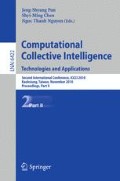Abstract
This paper presents a novel hardware architecture based on generalized Hebbian algorithm (GHA) for texture classification. In the architecture, the weight vector updating process is separated into a number of stages for lowering area costs and increasing computational speed. Both the weight vector updating process and principle component computation process can also operate concurrently to further enhance the throughput. The proposed architecture has been embedded in a system-on-programmable-chip (SOPC) platform for physical performance measurement. Experimental results show that the proposed architecture is an efficient design for attaining both high speed performance and low area costs.
Access this chapter
Tax calculation will be finalised at checkout
Purchases are for personal use only
Preview
Unable to display preview. Download preview PDF.
References
Gunter, S., Schraudolph, N.N., Vishwanathan, S.V.N.: Fast Iterative Kernel Principal Component Analysis. Journal of Machine Learning Research, 1893–1918 (2007)
Haykin, S.: Neural Networks and Learning Machines, 3rd edn. Pearson, London (2009)
Jolliffe, I.T.: Principal component Analysis, 2nd edn. Springer, Heidelberg (2002)
Karhunen, J., Joutsensalo, J.: Generalization of Principal Component Analysis, Optimization Problems, and Neural Networks. Neural Networks, 549–562 (1995)
Kim, K., Franz, M.O., Scholkopf, B.: Iterative kernel principal component analysis for image modeling. IEEE Trans. Pattern Analysis and Machine Intelligence, 1351–1366 (2005)
Lin, S.J., Hung, Y.T., Hwang, W.J.: Fast Principal Component Analysis Based on Hardware Architecture of Generalized Hebbian Algorithm. In: ISICA 2010. LNCS. Springer, Heidelberg (2010) (to be published)
Sanger, T.D.: Optimal unsupervised learning in a single-layer linear feedforward neural network. Neural Networks 12, 459–473 (1989)
NIOS II Processor Reference Handbook, Altera Corporation (2010), http://www.altera.com/literature/lit-nio2.jsp
Cyclone III Device Handbook, Altera Corporation (2010), http://www.altera.com/products/devices/cyclone3/cy3-index.jsp
Author information
Authors and Affiliations
Editor information
Editors and Affiliations
Rights and permissions
Copyright information
© 2010 Springer-Verlag Berlin Heidelberg
About this paper
Cite this paper
Lin, SJ., Hung, YT., Hwang, WJ. (2010). Efficient GHA-Based Hardware Architecture for Texture Classification. In: Pan, JS., Chen, SM., Nguyen, N.T. (eds) Computational Collective Intelligence. Technologies and Applications. ICCCI 2010. Lecture Notes in Computer Science(), vol 6422. Springer, Berlin, Heidelberg. https://doi.org/10.1007/978-3-642-16732-4_22
Download citation
DOI: https://doi.org/10.1007/978-3-642-16732-4_22
Publisher Name: Springer, Berlin, Heidelberg
Print ISBN: 978-3-642-16731-7
Online ISBN: 978-3-642-16732-4
eBook Packages: Computer ScienceComputer Science (R0)

